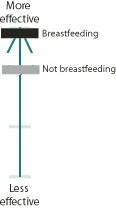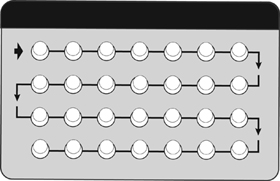Chapter 2 Download Chapter
CHAPTER 2 - Progestin-Only Pills
This chapter on progestin-only pills focuses on breastfeeding women. Women who are not breastfeeding also can use progestin-only pills. Guidance that differs for women who are not breastfeeding is noted.
What Are Progestin-Only Pills?
- Pills that contain very low doses of a progestin like the natural hormone progesterone in a woman’s body.
- Do not contain estrogen, and so can be used throughout breastfeeding and by women who cannot use methods with estrogen.
- Progestin-only pills (POPs) are also called “minipills” and progestin-only oral contraceptives.
- Work primarily by:
- Thickening cervical mucus (this blocks sperm from meeting an egg)
- Disrupting the menstrual cycle, including preventing the release of eggs from the ovaries (ovulation)
How Effective?
Effectiveness depends on the user: For women who have monthly bleeding, risk of pregnancy is greatest if pills are taken late or missed completely.
 Breastfeeding women:
Breastfeeding women:
- As commonly used, about 1 pregnancy per 100 women using POPs over the first year. This means that 99 of every 100 women will not become pregnant.
-
When pills are taken every day, less than 1 pregnancy per 100 women using POPs over the first year (3 per 1,000 women).
Less effective for women not breastfeeding:
-
As commonly used, about 7 pregnancies per 100 women using POPs over the first year. This means that 93 of every 100 women will not become pregnant.
- When pills are taken every day at the same time, less than 1 pregnancy per 100 women using POPs over the first year (3 per 1,000 women).
Return of fertility after POPs are stopped: No delay
Protection against sexually transmitted infections (STIs): None
| Why Some Women Say They Like Progestin-Only Pills |
|---|
|
